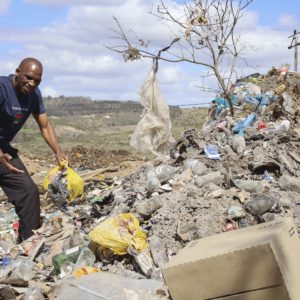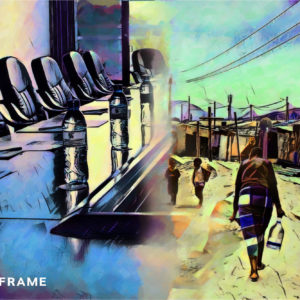All of them must go!
Monday’s elections offer scant hope for a way out of our escalating crisis. Reality demands a rigorous pessimism of the intellect if we are to generate a viable optimism of the will.
Author:
29 October 2021

It seems likely that the elections on Monday will bring significant change to how many of our cities are ruled. All the surveys show that millions of South Africans hold local government in contempt, that a significant number of former ANC supporters will not be able to bring themselves to vote for a party that is now rotten from the bottom to the top, and that there will be a sharp decline in turnout.
Those who naïvely thought that the Freedom Charter, the Constitution, the moral authority accrued by the ANC during the struggle against apartheid or the plethora of non-governmental organisations (NGOs) would mean South Africa would, in time, be Sweden with better weather and less cheesy pop music were always living in a fantasy.
But there were good reasons to think that the ANC wouldn’t end up, as one wit observed, taking Frantz Fanon’s excoriating critique of post-colonial elites as a manual rather than a warning. At the time of the transition to democracy, there was a clear understanding of how wrong things had gone elsewhere, along with a good number of principled leaders, a strong and democratic trade union movement, the recent experience of popular organisation on a huge scale, a large swathe of progressive lawyers, journalists and other kinds of intellectuals, and a general expectation that the ANC should and would offer, as it said, a better life for all.
Related article:
But with the demobilisation of popular power, the capture of activists by an NGO complex, a rapid embrace of the economic dictums imposed by the West and the international institutions it controls, a violently paranoid response to autonomous organisation and then, in the end, a collapse into the astounding crudities of the laughing, lying, murdering kleptocracy presided over by Jacob Zuma, rational grounds for hope were upended and smashed on to the rocks of reality over and over again until there was nothing left.
The ANC took a heavy hit in the 2016 local government elections as many of its supporters, a good number now living in the growing squalor produced by state contempt, stayed away in disgust at Zuma and what the party had become. The loss of control over three major cities was a clear indication that its hegemony was in rapid decline and that Zuma, despite adopting a populist posture, was not popular.
Trampling the green shoots
Of course, the ANC’s support picked up in the 2019 general elections with the hope that Cyril Ramaphosa would bring in a “new dawn” and deal with the kleptocrats. There has been progress here and there, but the party is so rotten that it’s hard to see how even a morally grounded and decisive president could clean out the muck and stay in office.
Frenzied corruption and murderous state violence have continued under Ramaphosa. The party’s national executive committee and Ramaphosa’s Cabinet are both riddled with deeply compromised people. At the same time, the turn to neoliberal policies in some areas and the devastation of the authoritarian response to the Covid pandemic have exacerbated the pre-existing crisis of mass unemployment and hunger.
Related article:
The riots in July illuminated, in dramatic relief, some key elements of our general crisis. One is the impunity for the violent criminality within the faction of the ANC that cohered around Zuma and seeks access to the state to plunder that part of the common wealth of society that ends up as state revenue. That men claiming to be Umkhonto weSizwe veterans could openly attack migrants in central Durban and that armed men – possibly including masked police officers – could attack trucks, sometimes killing the drivers, with impunity was a clear indication that Ramaphosa had no will or capacity, or both, to contain this often violent political mafia.
The staggeringly huge food riots that erupted as people witnessed the impunity for the actions of the small forces now often clandestinely mobilised in support of the Zuma project were a vast, rolling material expression of the simple non-viability of mass impoverishment and its consequent hunger. They were also an insurgent indication that social devastation would not be borne with quiescence in perpetuity.
A fragmenting society
In many neighbourhoods, the food riots were initially carried out in a spirit of carnival, but the nihilism of the methodical, generalised looting that followed had a very different spirit. It was an expression of the general breakdown in any sense of society as a collective project, and a collapse into a sense that society is merely a terrain of contestation – frequently nasty and brutish – in which one grabs as much for oneself as quickly as possible.
Then there was the complete absence of the state in a time of real crisis, and the racialised violence that followed, most notoriously in Phoenix, as people, abandoning any sense of a collective understanding of society, armed themselves and retreated into laagers.
Related article:
Our crisis exceeds the points driven home so hard in the riots, but July was a turning point, a stark confrontation with the collapse not just of emancipatory hopes, but also the most basic kinds of confidence in society. Only a psychopath could sleep easy in a country in which millions go hungry and confront adult life without the prospect of work, personal safety is under constant threat, the police are largely a vicious mafia in uniform, activists are murdered, thrown into jail on bogus charges and have their homes burnt, town and cities are crumbling and, in a visceral sign of state contempt, people live on crumbling streets amid piles of rotting, stinking rubbish.
Now, on the eve of the elections, the body count is rising, the lights are off, the national cricket team is imploding again, Iqbal Survé is making Donald Trump look comparatively rational, the middle classes are rushing to the airports and the extraordinarily brazen abuse of the criminal justice system to repress grassroots activists in Durban is escalating.
Hard to be hopeful
There is little hope that the elections will improve things. If, as the polls show, support for the ANC declines and the party cannot rule many of the major cities on its own, coalitions will be required. If the ANC does not have enough support to rule with the smaller parties, it will have to turn to the EFF and the DA. Some think that Herman Mashaba’s ActionSA could also be a significant player in certain coalition negotiations.
Mashaba’s xenophobia and the way he cut the EFF into municipal tenders when he was the mayor of Johannesburg are an ominous indication of the sort of role that he could play in a coalition government. The DA would push any coalition towards the kind of security-driven neoliberal urbanism that fractures society, isolates the rich and contains and expels impoverished people.
The EFF is not just alarmingly authoritarian. It has shown, in and out of office, that it is as kleptocratic as the worst elements in the ANC. With leaders willing to steal from the impoverished to finance personal enrichment, the party’s claim to offer an emancipatory alternative through authoritarian nationalism is as credible as the claims of the Zuma faction to be a popular force on the side of the people.
The political class in this country is, across the board, utterly contemptible. But we all know that now. What we have to face squarely is the failure of society to generate any decent alternatives at the sort of scale that could make a real difference. That is our failure.
Related article:
Many societies have fallen into a serious crisis and found a way out. In 2001, when the economy in Argentina collapsed after years of neoliberalism resulting in a severe social and political crisis, a general disgust at the political class as a whole led people to rally around the slogan Que se vayan todos! (All of them must go!).
Protests began in the impoverished peripheries of Buenos Aires. They initially took the form of road blockades and burning tyres and then developed into riots, looting and occupations of public space. A significant number of middle-class people joined this general rebellion, which, unlike the recent riots here, generated a clear political sensibility and set of demands. In the end, a rotten political class was removed from office and the economy made a remarkable recovery.
In South Africa, it is very difficult to imagine the middle classes throwing in their lot with the impoverished majority. Marked by a relentless elitism, and disregard and contempt for the impoverished majority, the middle class is, despite its smug pretensions to the contrary, plainly not a democratic actor. It is, as much as the rotten political class, shovelling earth on the coffin in which the remnants of our social hopes are now ensconced in a six-foot hole in the ground.
These are the realities that we must confront if we wish to find a way out of the crisis.




